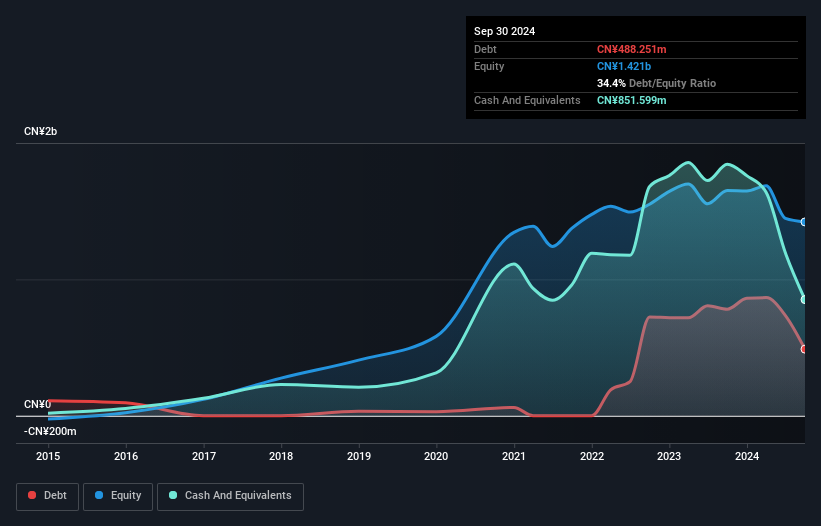- China
- /
- Consumer Durables
- /
- SZSE:300894
Marssenger Kitchenware (SZSE:300894) Has A Pretty Healthy Balance Sheet

The external fund manager backed by Berkshire Hathaway's Charlie Munger, Li Lu, makes no bones about it when he says 'The biggest investment risk is not the volatility of prices, but whether you will suffer a permanent loss of capital.' So it might be obvious that you need to consider debt, when you think about how risky any given stock is, because too much debt can sink a company. We note that Marssenger Kitchenware Co., Ltd. (SZSE:300894) does have debt on its balance sheet. But is this debt a concern to shareholders?
What Risk Does Debt Bring?
Debt assists a business until the business has trouble paying it off, either with new capital or with free cash flow. Ultimately, if the company can't fulfill its legal obligations to repay debt, shareholders could walk away with nothing. However, a more usual (but still expensive) situation is where a company must dilute shareholders at a cheap share price simply to get debt under control. Having said that, the most common situation is where a company manages its debt reasonably well - and to its own advantage. When we think about a company's use of debt, we first look at cash and debt together.
View our latest analysis for Marssenger Kitchenware
How Much Debt Does Marssenger Kitchenware Carry?
The image below, which you can click on for greater detail, shows that Marssenger Kitchenware had debt of CN¥488.3m at the end of September 2024, a reduction from CN¥781.2m over a year. But on the other hand it also has CN¥851.6m in cash, leading to a CN¥363.3m net cash position.

How Healthy Is Marssenger Kitchenware's Balance Sheet?
According to the last reported balance sheet, Marssenger Kitchenware had liabilities of CN¥431.3m due within 12 months, and liabilities of CN¥567.1m due beyond 12 months. On the other hand, it had cash of CN¥851.6m and CN¥156.0m worth of receivables due within a year. So its total liabilities are just about perfectly matched by its shorter-term, liquid assets.
This state of affairs indicates that Marssenger Kitchenware's balance sheet looks quite solid, as its total liabilities are just about equal to its liquid assets. So it's very unlikely that the CN¥5.59b company is short on cash, but still worth keeping an eye on the balance sheet. Succinctly put, Marssenger Kitchenware boasts net cash, so it's fair to say it does not have a heavy debt load!
It is just as well that Marssenger Kitchenware's load is not too heavy, because its EBIT was down 88% over the last year. When it comes to paying off debt, falling earnings are no more useful than sugary sodas are for your health. The balance sheet is clearly the area to focus on when you are analysing debt. But it is future earnings, more than anything, that will determine Marssenger Kitchenware's ability to maintain a healthy balance sheet going forward. So if you want to see what the professionals think, you might find this free report on analyst profit forecasts to be interesting.
Finally, a company can only pay off debt with cold hard cash, not accounting profits. While Marssenger Kitchenware has net cash on its balance sheet, it's still worth taking a look at its ability to convert earnings before interest and tax (EBIT) to free cash flow, to help us understand how quickly it is building (or eroding) that cash balance. Over the most recent three years, Marssenger Kitchenware recorded free cash flow worth 54% of its EBIT, which is around normal, given free cash flow excludes interest and tax. This free cash flow puts the company in a good position to pay down debt, when appropriate.
Summing Up
While it is always sensible to investigate a company's debt, in this case Marssenger Kitchenware has CN¥363.3m in net cash and a decent-looking balance sheet. So we don't have any problem with Marssenger Kitchenware's use of debt. When analysing debt levels, the balance sheet is the obvious place to start. But ultimately, every company can contain risks that exist outside of the balance sheet. For example Marssenger Kitchenware has 3 warning signs (and 2 which are concerning) we think you should know about.
When all is said and done, sometimes its easier to focus on companies that don't even need debt. Readers can access a list of growth stocks with zero net debt 100% free, right now.
New: Manage All Your Stock Portfolios in One Place
We've created the ultimate portfolio companion for stock investors, and it's free.
• Connect an unlimited number of Portfolios and see your total in one currency
• Be alerted to new Warning Signs or Risks via email or mobile
• Track the Fair Value of your stocks
Have feedback on this article? Concerned about the content? Get in touch with us directly. Alternatively, email editorial-team (at) simplywallst.com.
This article by Simply Wall St is general in nature. We provide commentary based on historical data and analyst forecasts only using an unbiased methodology and our articles are not intended to be financial advice. It does not constitute a recommendation to buy or sell any stock, and does not take account of your objectives, or your financial situation. We aim to bring you long-term focused analysis driven by fundamental data. Note that our analysis may not factor in the latest price-sensitive company announcements or qualitative material. Simply Wall St has no position in any stocks mentioned.
About SZSE:300894
Marssenger Kitchenware
Engages in the research and development, design, production, and sale of kitchen appliances and other household electrical appliances in China.
Moderate growth potential with mediocre balance sheet.
Market Insights
Community Narratives




